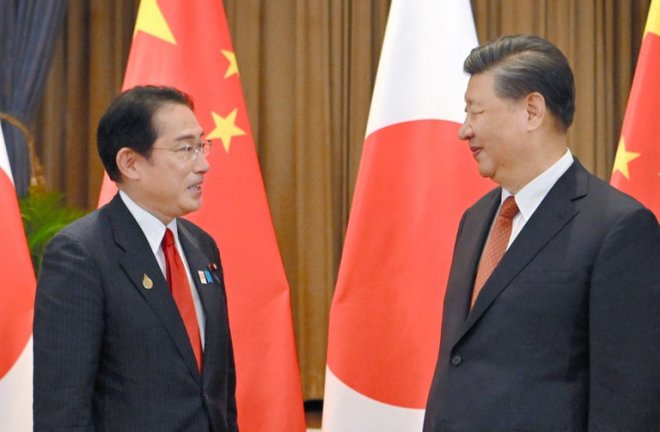Japan-China defense hotline aims to cut risk of clashes*
Japan and China are to start a defense hotline in the spring to minimize risks of incidents as the Chinese military is accused of advancing “gray zone” operations in contested waters between the two countries.
Japanese media quoted Foreign Minister Yoshimasa Hayashi as saying earlier this week that a military hotline is likely to begin operating in spring 2023 and will "play an extremely important role in building confidence and avoiding unexpected contingencies."
The two countries launched a Maritime and Aerial Communication Mechanism in 2018 to avoid accidental clashes, under which they agreed to work towards establishing rules for direct communications including a hotline but little progress has been made until now.
During their first meeting in three years,, on the sidelines of the Asia-Pacific Economic Cooperation forum last month, Chinese President Xi Jinping and Japanese Prime Minister Fumio Kishida agreed to speed up the process.
![]()
Japanese Prime Minister Fumio Kishida meets Chinese President Xi Jinping on the sidelines of the Asia-Pacific Economic Cooperation (APEC) Summit in Bangkok, Nov. 17, 2022. CREDIT: Kyodo via Reuters
China-Japan relations have been strained in recent years as Beijing seeks to exert influence in the region.
Japan is supportive of the U.S.’s Indo-Pacific Strategy and forms part of the Quadrilateral Security Dialogue that China labels an “Asia-Pacific version of NATO.”
Commonly known as Quad, the grouping consists of the U.S., Japan, India and Australia and is largely seen as an effort to counter China’s growing power projection in the Indo-Pacific.
Japan at the same time has sought stronger ties with NATO with Kishida becoming the first Japanese premier to attend the bloc’s summit in June.
‘Gray zone’ operations
China and Japan have been at loggerheads over the Senkaku Islands in the East China Sea, controlled by Tokyo but also claimed by Beijing, which calls them Diaoyu.
Government vessels from both sides have been confronting each other in the area on almost a daily basis.
A newly-released security report by the Japanese Defense Ministry’s think tank - the National Institute for Defense Studies – said China “has attempted to change the status quo through low intensity conflicts in the maritime domain.”
So-called “gray zone” tactics have been utilized by China to manage the intensity of disputes so they do not lead to armed conflict, and to exert pressure on adversaries, thereby gradually expanding China’s rights and interests, the China Security Report 2023 said.
“By integrating maritime actors (the coast guard and the maritime militia) into the military, the Chinese leadership seeks to create gray zone situations constantly and exert pressure on the opponent while avoiding military clashes with other countries,” it said, noting that “China has improved its gray zone operations capabilities in disputed areas.”
Shinji Yamaguchi, one of the authors, told journalists at the report’s launch in Tokyo that the Chinese coast guard and maritime militia have stepped up activities since the 2010s and have also weaponized their operations.
China’s coast guard has been enlarged and armed, and the new Coast Guard Law stipulates that weapons could be used as “police authority.”
Beijing, however, employs a more hard-line stance in the South China Sea than in the East China Sea, the report noted.
Six parties: Brunei, Malaysia, the Philippines, Taiwan, Vietnam and China hold overlapping claims in the South China Sea but Beijing’s claims are by far the most expansive.
 | 喜歡這篇嗎?快分享吧! |
前一頁
後一頁
 Japanese Prime Minister Fumio Kishida meets Chinese President Xi Jinping on the sidelines of the Asia-Pacific Economic Cooperation (APEC) Summit in Bangkok, Nov. 17, 2022. CREDIT: Kyodo via Reuters
Japanese Prime Minister Fumio Kishida meets Chinese President Xi Jinping on the sidelines of the Asia-Pacific Economic Cooperation (APEC) Summit in Bangkok, Nov. 17, 2022. CREDIT: Kyodo via Reuters